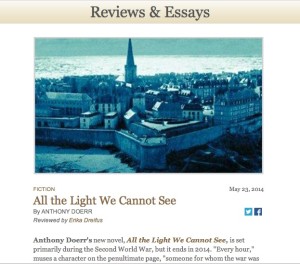Jewish Literary Links for Shabbat

Shabbat shalom.

Shabbat shalom.
 Last week brought the publication of my first piece for The Barnes & Noble Review: a review of Anthony Doerr’s oh-so-impressive new novel All the Light We Cannot See. I’m really proud of this review and happy to share it.
Last week brought the publication of my first piece for The Barnes & Noble Review: a review of Anthony Doerr’s oh-so-impressive new novel All the Light We Cannot See. I’m really proud of this review and happy to share it.
Something interesting happened with this assignment that I thought I’d mention here as a sort of how-to reminder.
If you’re a reviewer and/or familiar with the galley versions that are circulated to reviewers and other early readers ahead of publication, you may have noticed these cautionary words that often accompany them: (more…)
 Monday brings the weekly batch of no-fee competitions/contests, paying submission calls, and jobs for those of us who write (especially those of us who write fiction, poetry, and creative nonfiction). (more…)
Monday brings the weekly batch of no-fee competitions/contests, paying submission calls, and jobs for those of us who write (especially those of us who write fiction, poetry, and creative nonfiction). (more…)
In which I participate in David Abrams’s “Sunday Sentence” project, sharing the best sentence I’ve read during the past week, “out of context and without commentary.”
Okay, “commentary alert”! This week, I had to choose two sentences. They’re both from the same piece.
Just as it is considered a breach of prison etiquette for visitors to ask the incarcerated what brought them, say, to Cayuga Correctional Facility, the rules for casual social exchange in the weeks from mid-May to late June ought to require that no one ever ask anyone with a day job what she is doing “for the summer.”
and
It is that summer supplies energy to whole new channels of resentment: toward the painter who has secured the three-week fellowship at Yaddo; toward the academic who is teaching a course at the University of Edinburgh; toward the psychotherapist who is decamping to Wellfleet; toward the inveterate bohemian who has sublet her Chelsea apartment to a group of professional clowns so that she can travel with her daughter through Patagonia.
The source of these insightful sentences? Ginia Bellafante, writing for The New York Times. My only quibble is the piece’s title: “Sympathy for the Working Mother.” (One need not be a mother to identify with and applaud these particular lines! I daresay many of my fellow writers-with-day-jobs, regardless of parenting status, may share these feelings.)

 Writing-related resources, news, and reflections to enjoy over the weekend. (more…)
Writing-related resources, news, and reflections to enjoy over the weekend. (more…)